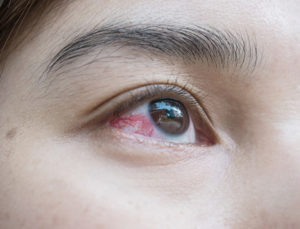Are Those Symptoms What You Think?

There are two conditions that may be at the heart of chronic eye irritation. One is allergies, and one is dry eye syndrome. Doctors often refer to chronic dryness as a syndrome or disease because the condition persists without proper treatment.
Dry Eye Syndrome
Dry eye syndrome coincides with a disruption in tear production. Usually, the disruption occurs in the Meibomian glands that are situated at the edges of the eyelids. These glands produce the lipids, or oils that make up the top layer of tears on the eyes’ surface. Without an adequate lipid layer, the water in tears evaporates too quickly. As a result, the eyes water more and yet continues to feel gritty.
Allergies
Allergies can affect the eyes in similar ways to dry eye syndrome, causing a sandy sensation and chronic redness. One way that we can tell allergies from the chronic dry eye, though, is to observe if itching is also present.
A thorough exam and consultation are necessary to fully differentiate between dry eyes and allergies because the two are so similar. Also, each will improve only with appropriate treatment. If you were to treat dry eye syndrome with allergy medication, there is a chance the problem could worsen rather than improve.
Treating Eye Irritation
In many cases, both allergies and dry eye syndrome can improve with lifestyle changes. Patients with allergic eye symptoms are encouraged to identify triggers so they may be avoided. The use of over-the-counter antihistamine medication can also help. In some cases, allergies need to be evaluated more closely with an allergy specialist to reduce ocular and other symptoms.
A lifestyle change that may improve chronic dry eye includes developing the habit of blinking frequently and minimizing the use of computers and other digital devices until symptoms improve. Over-the-counter eye drops for dry eye syndrome may also improve symptoms. In more severe cases, it is necessary to visit an ophthalmologist for professional treatment such as punctual plugs.
Do you have questions about ocular symptoms? Call our Houston office at (713) 668-7337.
Category:

 CONNECT
CONNECT
Leave a Reply